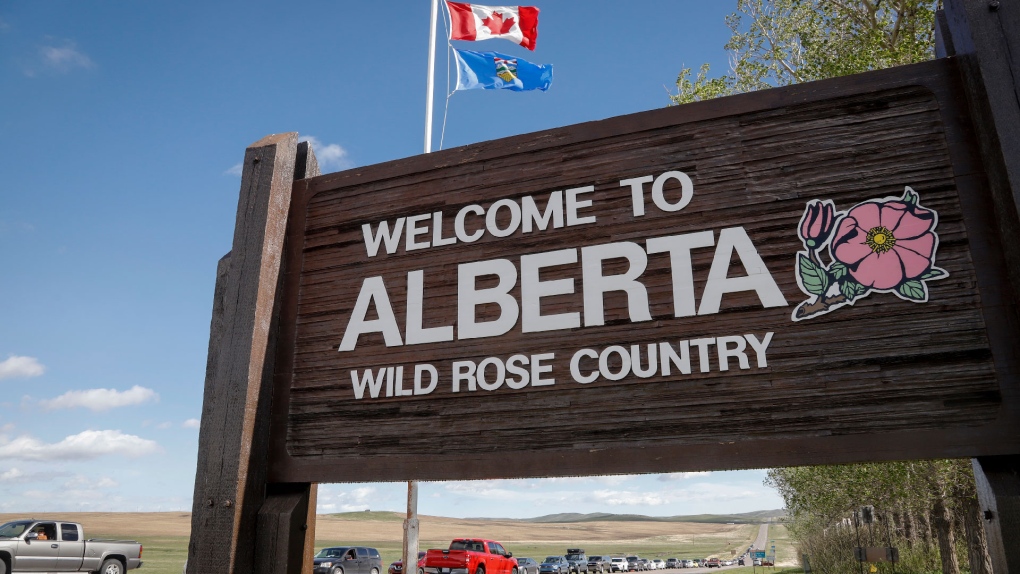More than half of Albertans struggling with daily expenses
 Welcome to Alberta sign near Carway, Alta., on May 18, 2021. (THE CANADIAN PRESS/Jeff McIntosh)
Welcome to Alberta sign near Carway, Alta., on May 18, 2021. (THE CANADIAN PRESS/Jeff McIntosh)
Goodbye, Alberta advantage. Half of the province's residents say they are struggling to keep up with daily expenses amid a cost-of-living crisis.
According to a recent Statistics Canada survey, 51 per cent of Albertans say rising costs are greatly affecting their ability to meet day-to-day expenses, more than in any other province and six points higher than the national average.
Alicia Planincic, an economist with the Business Council of Alberta, said if you break the inflation data down, there isn’t a huge difference province-to-province on food and bigger budget items.
But when it comes to housing, costs in Alberta have soared.
“The thing that is unique to Alberta is really the housing costs. And if you drill down a little bit further, it's really rent in particular,” Planincic said.
The average rent in Alberta has grown 15 per cent in the last year to $1,810, according to the August rent report by rentals.ca and Urbanation.
“I do think that very clearly where Albertans are feeling this inflation challenge the most is in housing,” she said.
Planincic said Alberta also has higher debt loads and a higher unemployment rate than many other provinces, which could be contributing to the people’s financial anxieties.
While costs are rising, average wages in the province have fallen, putting additional affordability strains on Albertans, says Bradley Lafortune, executive director of Public Interest Alberta.
“The real thing that I think we're seeing, and we will continue to see, is the erasing of the so-called Alberta advantage when it comes to wages and earnings of Albertans compared to the rest of Canada.
"Whether it's hourly wages or average weekly earnings, we've just seen that Alberta advantage completely evaporate over the last several years,” Lafortune said.
Ten years ago, wages in Alberta were 17 per cent higher than the Canadian average, but real wages in the province have since fallen by 10 per cent, according to a study from economist Jim Stanford released in the spring.
The province’s nominal minimum wage has been frozen at $15 an hour since 2018, while the average minimum wage across Canada has grown by 27 per cent during the same time.
“Combined with inflation that is still quite high in Alberta, Albertans are really, really feeling the pinch, at least relative to what they were able to absorb previously in times of high inflation,” Lafortune said.
Along with the hot housing market, Lafortune noted Albertans also tend to pay more for insurance and utilities than elsewhere in the country.
“We have a relatively deregulated market compared to other big provinces like Ontario and British Columbia.
"So when you're looking at car insurance and you're looking at utilities, the cost of keeping the lights on and keeping the heat on, they are a lot higher. And those are not products that most people can go without spending money on,” he said.
The StatCan report found that the number of Canadians reporting rising prices were greatly affecting their ability to meet day-to-day expenses had increased by 12 per cent over the last two years, and that rising prices were disproportionately affecting low-income people.
CTVNews.ca Top Stories

opinion Tom Mulcair: Prime Minister Justin Trudeau's train wreck of a final act
In his latest column for CTVNews.ca, former NDP leader and political analyst Tom Mulcair puts a spotlight on the 'spectacular failure' of Prime Minister Justin Trudeau's final act on the political stage.
B.C. mayor gets calls from across Canada about 'crazy' plan to recruit doctors
A British Columbia community's "out-of-the-box" plan to ease its family doctor shortage by hiring physicians as city employees is sparking interest from across Canada, says Colwood Mayor Doug Kobayashi.
'There’s no support': Domestic abuse survivor shares difficulties leaving her relationship
An Edmonton woman who tried to flee an abusive relationship ended up back where she started in part due to a lack of shelter space.
opinion King Charles' Christmas: Who's in and who's out this year?
Christmas 2024 is set to be a Christmas like no other for the Royal Family, says royal commentator Afua Hagan. King Charles III has initiated the most important and significant transformation of royal Christmas celebrations in decades.
Baseball Hall of Famer Rickey Henderson dead at 65, reports say
Rickey Henderson, a Baseball Hall of Famer and Major League Baseball’s all-time stolen bases leader, is dead at 65, according to multiple reports.
Arizona third-grader saves choking friend
An Arizona third-grader is being recognized by his local fire department after saving a friend from choking.
Germans mourn the 5 killed and 200 injured in the apparent attack on a Christmas market
Germans on Saturday mourned the victims of an apparent attack in which authorities say a doctor drove into a busy outdoor Christmas market, killing five people, injuring 200 others and shaking the public’s sense of security at what would otherwise be a time of joy.
Blake Lively accuses 'It Ends With Us' director Justin Baldoni of harassment and smear campaign
Blake Lively has accused her 'It Ends With Us' director and co-star Justin Baldoni of sexual harassment on the set of the movie and a subsequent effort to “destroy' her reputation in a legal complaint.
Oysters distributed in B.C., Alberta, Ontario recalled for norovirus contamination
The Canadian Food Inspection Agency has issued a recall due to possible norovirus contamination of certain oysters distributed in British Columbia, Alberta and Ontario.


































